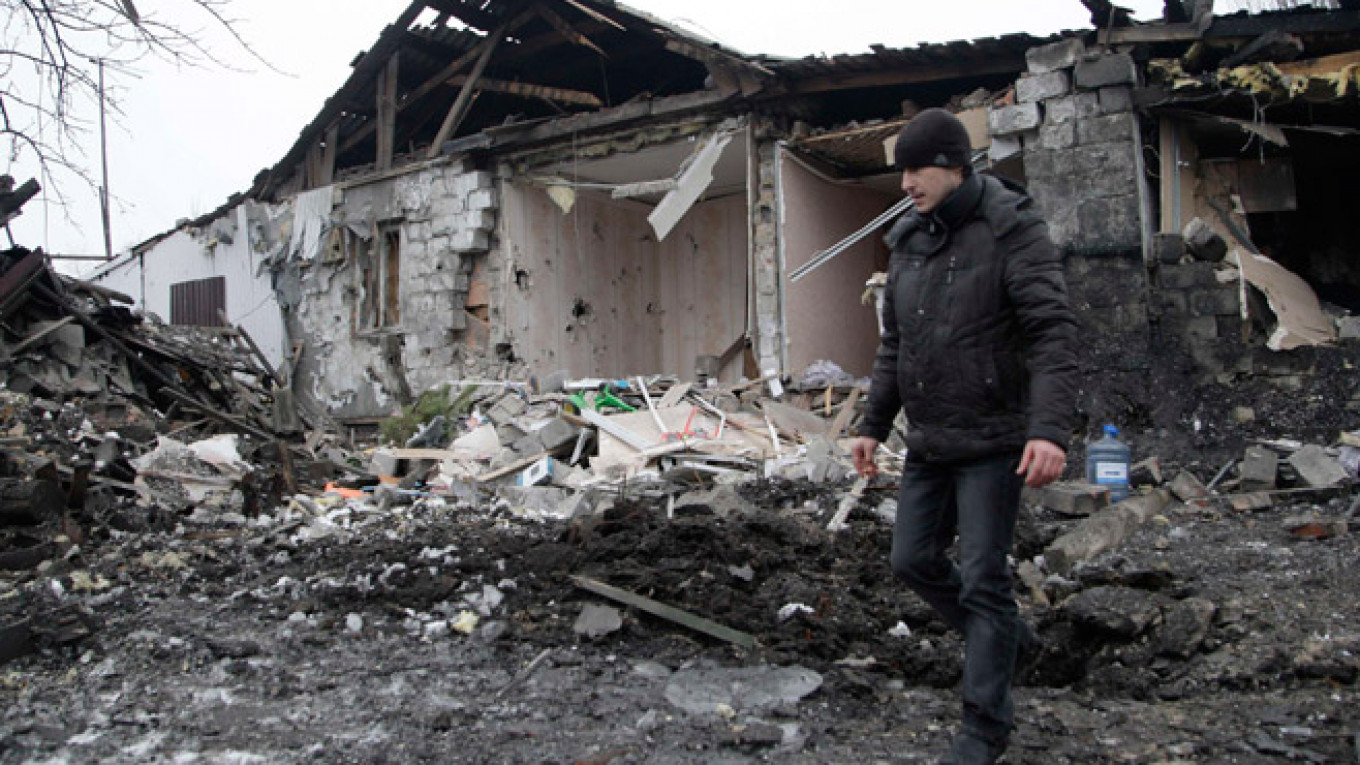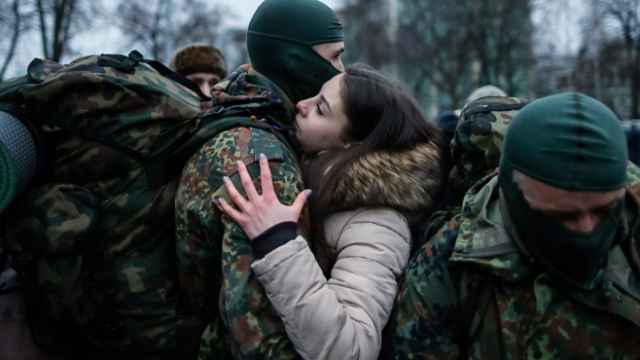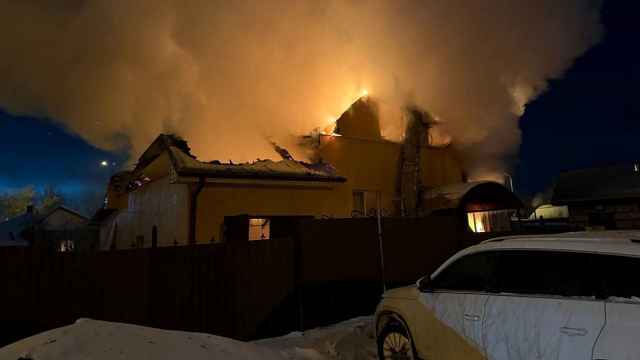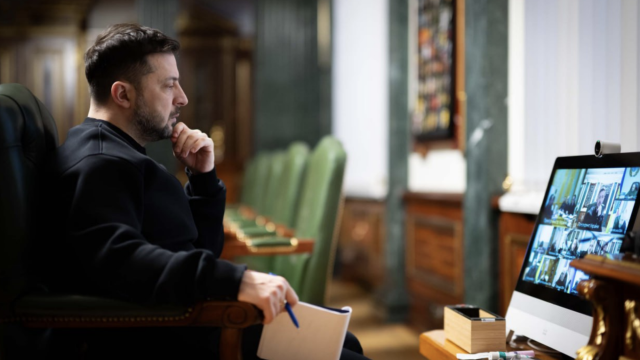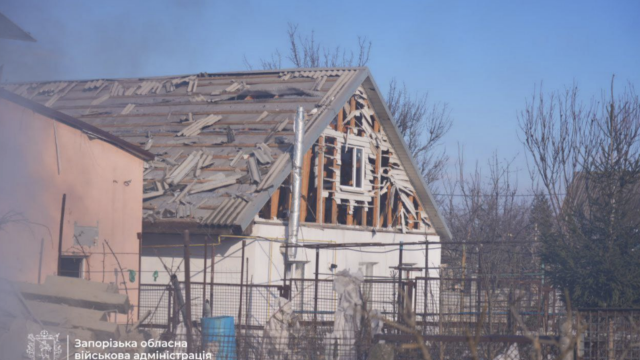DONETSK, Ukraine — Despair and a bitter sense of having been abandoned by both Russia and Ukraine reign among residents of the rebellious Ukrainian city of Donetsk after two weeks of renewed heavy shelling between pro-Russian separatists and the central government in Kiev amid a tattered cease-fire.
"They want us all killed! Something big is going on! When will it be over?" Such remarks dominate conversation on the street as the dreaded rumbling of cannonade rises to a terrifying crescendo.
Donetsk — an industrial and transportation hub in eastern Ukraine with a population of over 1 million before it became the epicenter of the separatist conflict allegedly supported by Moscow — is now a surreal mixture of seemingly ordinary urban life and arms-obsessed guerrilla bravado against a background of apartment buildings bombed into rubble on the city outskirts and long lines all over the city for food, humanitarian aid and medicine.
Two months ago, the longest lines were for banks and ATMs. Cash was limited, as were bank opening hours. It was in one such line that I saw my first civilian death in Donetsk — an old lady whose heart gave out while she waited.
Desperation and anger last week dominated the line for a municipal pharmacy where free-of-charge prescription medicines can be obtained, in theory.
"I have a prescription from November. So what? I can't get any medicine," said a 35-year-old woman who did not wish to be named, citing fear for her safety. "They always tell me to come back later, the same thing time after time!"
The woman added that she sometimes had to stand in line three times to receive food that was being distributed from a Russian humanitarian convoy in the center of the city.
"Is this food?" she said, holding out a small bag containing some grains. "One kilogram of porridge, which I have to stand in line for two hours to get. It's a joke!"
The woman said she had three children and they were doing their best to survive on her mother-in-law's pension of just 1,200 hryvnas ($75) per month— paid by the region's separatist self-proclaimed government.
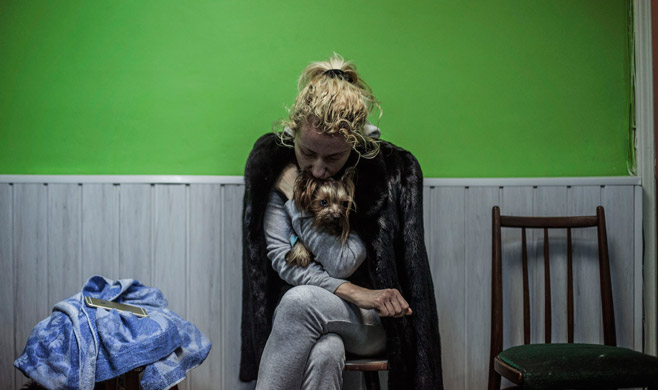
A Donetsk woman holding her dog in a shelter. Some locals live in bomb shelters, leaving only when necessary.
Ukraine's richest man, Rinat Akhmetov, who hails from the Donetsk region, has organized his own aid shipments from inside territory controlled by the Kiev government. They are distributed directly among the residents, unlike Russian humanitarian shipments, which go to the rebel authorities.
The woman added that she would move to Russia if she had the chance, because "everyone lives well and has more money there." An old man nearby said: "Russia has abandoned us," and silence descended.
The pharmacy staff said that they hadn't received any medicine from humanitarian convoys since September, and that they have to send more than 80 percent of people home empty-handed.
Privately owned pharmacies, in contrast, are fully stocked with medical supplies — that many believe come from aid shipments — and prices there are far above what most Donetsk residents can afford.
Galazolin, for example, is a decongestant nasal spray that costs 30 rubles ($0.45) in Russia. In Donetsk, the cheapest to be found costs 30 hryvnas ($2). Unlike the municipal pharmacies, privately owned ones rarely have lines of more than two people.
Running Out of Time
At Donetsk's Hospital No. 1, shortages of medical supplies are severe enough to be life-threatening. Until recently, the hospital's dialysis center was operating on a one-year grant from the Ukrainian government, despite being located in separatist territory. Now the money has run out, along with supplies of drugs, and more than 40 dialysis patients could die in the coming weeks if they do not receive treatment, said the hospital's head doctor, Vadim Merkurev.
The patients, who range in age from 28 to 77, have started their own survival campaign.
"We have sent letters to all charity organizations in Russia. We have called Doctors Without Borders and the Red Cross, but no one says anything concrete. The Russians promised that they would include [treatment for] us in the next humanitarian convoy," said Svetlana, one of the patients-turned-activists.
Despite the fact that even a two-week break in treatment could kill her, she is not considering going into Ukrainian government-controlled territory. Svetlana said she "would rather die than accept their treatment," even if it can still be provided to her free-of-charge.
Merkurev, the head doctor, blamed the hospital's troubles on the Ukrainian government, President Petro Poroshenko and an overall lack of collective spirit in the divided country.
"Russia didn't have any obligation to me directly. I did not have any expectations of Russia," he said. "Poroshenko said he would provide for our citizens. We all have Ukrainian citizenship, but we have no pensions, no salaries, no treatment. I can't say that anyone abandoned us. We all abandoned each other."
Hospital No. 1 is just one of many hospitals in Donetsk that have almost run out of medical supplies. Most medical officials say they have only enough drugs for two more weeks at most.
Empty Kitchens, Busy Restaurants
The situation is no different with food supplies: Long lines of mostly elderly people stretch in front of the distribution sites, and the few free canteens are almost empty, both of food and diners, and frequented mostly by homeless people.
Meanwhile, food stores are full of customers and every kind of food, with only one difference from life before the war: It is impossible to pay by card.
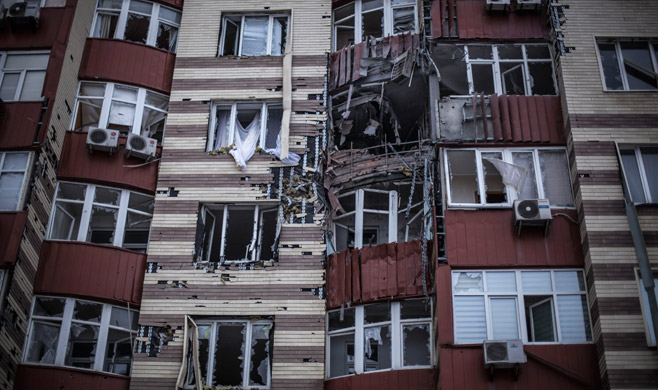
A building torn apart by artillery fire in the center of Donetsk on Sunday.
In the city center, the war is barely felt. Restaurants are open until late at night and there are always people dining inside. Shops are open as usual, and only the reduced selection of cigarettes and posters in local theaters asking audience members to leave guns in the cloakroom are reminders of the dangers in the conflict zone.
Locals have already gotten used to seeing armed people everywhere, and don't even blink at the sight of a man with an AK-47 walking around a shopping mall with a basket in his hand.
Life on the outskirts of Donetsk, however, is markedly different.
The Petrovsky, Oktyabrsky and Kuibyshivsky districts have been heavily shelled since the summer, and taxis will only go there during the day, if at all. A new rule issued by the city administration allows taxi drivers to refuse to go somewhere if they fear for their safety.
Local public transportation still runs there every day from 6 a.m. till 6 or 7 p.m., depending on the intensity of the shelling.
Lights go off early on the city's outskirts, as people believe it makes them less likely to become a target.
Almost every building there is damaged by shelling, some bearing gaping black holes where windows used to be, or plastic wrapping instead of glass.
People in the suburbs take the bus to work in the morning and go straight home again in the evening. No one walks in the local parks. No one talks on the streets in the evening.
Life Underground
Some residents live in bomb shelters, leaving them only to feed dogs they have left at home or to safeguard their property from looters.
"Grandma" Lyuba is a middle-aged woman whom I met while visiting a shelter in late September. She read me her own poetry about Poroshenko and "the fascists." She told me Putin would "never ever leave them to die."
I've visited her in the same shelter from time to time since. The people here change: some leave and some return, but Lyuba and her small television set are always here.
Scores of foreign journalists come to this basement, and Lyuba takes them on an excursion and tells the story of how shells were being fired all around her house in July. She cries every time she talks about it, and then she drinks tea together with the journalists. They like her straight answers and emotions.
I have heard her story so many times that I can tell it myself now. Lyuba has always been prepared for visitors, starting her mornings by putting make-up on in the dark. I was there when she met the new leader of the self-proclaimed Donetsk People's Republic, Alexander Zakharchenko, who came on Nov. 2 — the day before unrecognized elections — and promised to help with all her needs.
I was also there three weeks later, when a psychologist came to tell the people in the shelter that they had to leave the basement because the war was almost over and someone had to pay the bills. I was still there the next day, when the area was heavily shelled.
Since then I haven't seen Lyuba wearing makeup.
After watching the televised New Year's speeches of Russian President Vladimir Putin and Zakharchenko, she just wants to be left alone.
"Putin talked about Crimea, Zakharchenko about the war, but what about us? No one needs us. They have all abandoned us," she says.
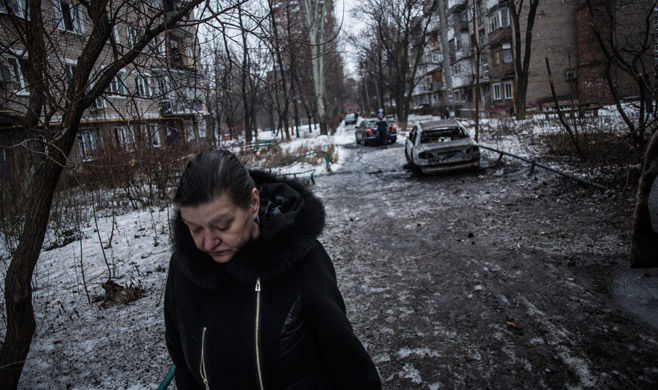
A woman walking through a residential area of Donetsk. Most of the city’s formerly bustling streets are deserted.
Lyuba says that it's too dangerous to send children to school or kindergarten, and she is not alone. Many parents either don't allow their children to go to school, or accompany them there.
Anna, an attractive, well-dressed woman whose apartment is close to the city center, does not send her oldest daughter, aged nine, to school anymore. Instead she accompanies her mother everywhere.
"Some parents go to school and stay with their kids for the whole day, but I haven't got anywhere to leave my small son," Anna said. "The kindergartens are open, but you have to pay 200 hryvnas [$13] per week just for the children's food. That's 1,000 per month! It used to be 100. What kind of luxury food must they be giving the kids?"
Anna has not worked since the war began last spring. She says her relatives and friends help a lot, but she expected to "wake up a part of Russia, like in Crimea" right after Donetsk's unrecognized independence referendum in May.
After Russia's annexation of Crimea last March, residents of the peninsula saw a hike in social benefits and salaries.
Anna occasionally goes to visit relatives in western Ukraine. Three of her cousins died fighting on the side of the Ukrainian national army against separatists.
New Regime
There are dozens of checkpoints in the city, where armed separatists used to stop every passing car to check the driver's documents, but now they seem to have become bored with the routine. More and more often they simply wave through the cars.
The self-proclaimed authorities set up a new police force in Donetsk in the fall, renaming the traffic police "politsia," like in Russia, rather than the Ukrainian "militsia" — but the traffic rules remain the same.
The self-proclaimed republic also introduced a military force to the city. Its role is not yet clear to the general public, but its officials are allowed to stop cars and people for document checks.
Boris Litvinov, head of the administration of the Donetsk People's Republic, insisted in a November interview that the rebel authorities are making progress in their state-building. According to him, social security payments have resumed, schools and kindergartens are open and the Donetsk People's Republic has already reopened the mining industry and even some munitions factories.
Litvinov said that the Donetsk People's Republic would soon even have its own currency.
Local television channels, meanwhile, continue to cover the recent New Year's celebrations and show an ornate Christmas tree that the authorities set up in the center of the city that wanted to leave Ukraine and join Russia, but ended up in limbo.
Contact the author at [email protected]
A Message from The Moscow Times:
Dear readers,
We are facing unprecedented challenges. Russia's Prosecutor General's Office has designated The Moscow Times as an "undesirable" organization, criminalizing our work and putting our staff at risk of prosecution. This follows our earlier unjust labeling as a "foreign agent."
These actions are direct attempts to silence independent journalism in Russia. The authorities claim our work "discredits the decisions of the Russian leadership." We see things differently: we strive to provide accurate, unbiased reporting on Russia.
We, the journalists of The Moscow Times, refuse to be silenced. But to continue our work, we need your help.
Your support, no matter how small, makes a world of difference. If you can, please support us monthly starting from just $2. It's quick to set up, and every contribution makes a significant impact.
By supporting The Moscow Times, you're defending open, independent journalism in the face of repression. Thank you for standing with us.
Remind me later.


